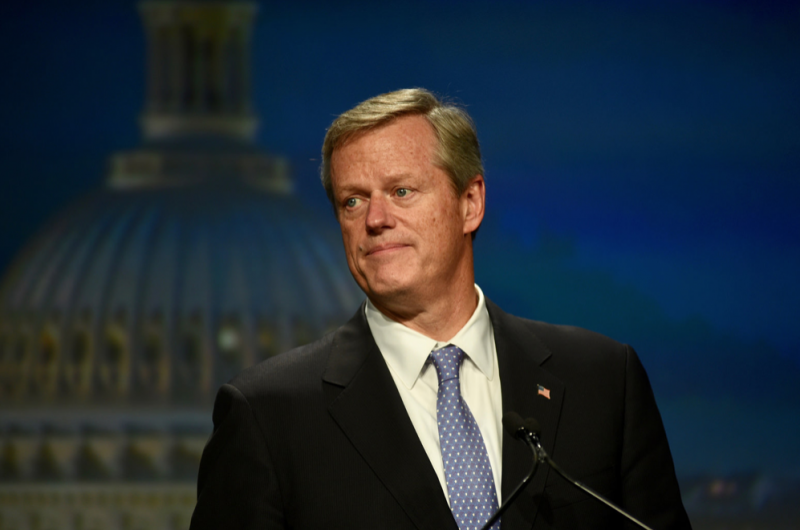
Today the governors of Massachusetts, Connecticut, and Rhode Island, along with Washington, D.C. Mayor Muriel Bowser, signed a Memorandum of Understanding to join together to implement the Transportation and Climate Initiative (TCI) program, a cap and trade scheme that would impose a regional carbon tax beginning in 2022.
The TCI program, according to the press release issued by the participating states, “will cut greenhouse gas pollution from motor vehicles in the region by an estimated 26% from 2022 to 2032, generate a total of more than $3 billion dollars over ten years for the participating jurisdictions to invest in equitable, less polluting transportation options and to help energize economic recovery.”
Massachusetts Governor Charlie Baker has sought for more than a year to convince government officials from 12 northeast and mid-Atlantic states to join the program. In the end three small states and the District of Columbia were the only jurisdictions to opt in, confirming that the focus of this program will be collecting more revenue from taxpayers, not affecting global emissions and climate.
The $3 billion in new revenue referred to in the TCI press release issued today will come from the increased gas prices that residents of TCI states will soon be paying. Initial estimates projected that TCI, once implemented, would raise gas prices by 17 cents per gallon in participating states. But a more recent report released by Tufts University this fall estimates that TCI would inflate gas prices by as much as 38 cents per gallon.
The Institute for Energy Research outlines how TCI would work in practice:
“Under the plan, wholesale suppliers of motor fuels would be required to buy pollution allowances through periodic auctions, with the proceeds going back to the states. The cap on these emissions will decline over time increasing the cost of the permits. The pact mirrors an agreement among the Northeast states aimed at reducing power plant carbon dioxide emissions, the Regional Greenhouse Gas Initiative.”
In the end Democratic governors from New York, New Jersey, Pennsylvania, Maine, and Delaware declined to join TCI. The Republican governors of New Hampshire, Vermont, and Maryland also refused to sign their states onto the TCI memorandum of understanding. New Hampshire Governor Chris Sununu (R), a Taxpayer Protection Pledge signer, was arguably TCI’s most prominent critic, coming out against the plan as soon as the initial iteration was floated nearly one year ago.
“I will not force Granite Staters to pay more for their gas just to subsidize other state’s crumbling infrastructure,” said Governor Chris Sununu in December 2019. “New Hampshire is already taking substantial steps to curb our carbon emissions, and this initiative, if enacted, would institute a new gas tax by up to 17 cents per gallon while only achieving minimal results. This program is a financial boondoggle and the people of New Hampshire will never support it.”
Christopher Carlozzi, Massachusetts director of the National Federation of Independent Businesses, points out that TCI will hammer small businesses at a time when they can least afford it.:
“The same small businesses that have faced shutdowns, countless restrictions, new regulations, and capacity limits will now face higher fuel costs due to Massachusetts joining the TCI,” Carlozzi said. “Restaurants require fuel to deliver food orders, plumbers and electricians must drive to job sites, construction companies utilize fuels to operate their equipment, and now TCI will make it more expensive to run these types of small businesses.”
“The fact that only three states signed onto the TCI memorandum of understanding is a poor showing for Governor Baker and carbon tax supporters, especially after more than a year of lobbying and cajoling from well-funded green lobbying groups,” said Grover Norquist, president of Americans for Tax Reform. “This is the latest example in what is a long history of rejection for carbon taxes and cap and trade programs that seek to impose carbon taxes through complex regulatory schemes.”

